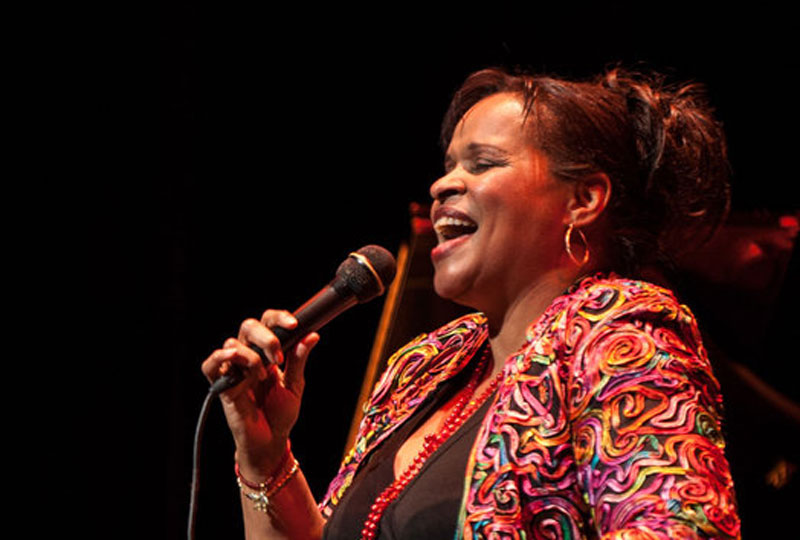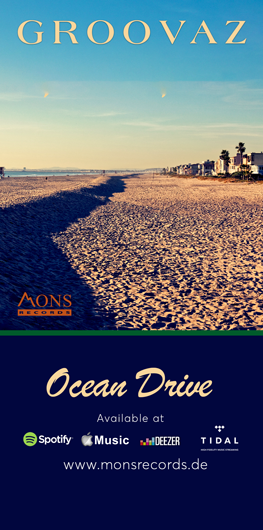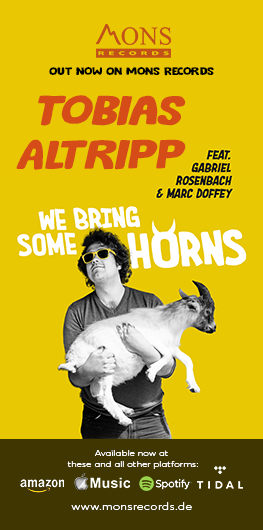HM: Who are your favorite singers? Can you choose 5?
DC: Of course, as a singer, you do have to pay attention to what Ella Fitzgerald and Sarah Vaughan did, but there are five singers who directly contributed to my own personal style, especially in my younger years:
1)Al Jarreau – before 1984
2) George Benson albums of the 70’s and 80’s.
3) Mark Murphy
4) Nancy Wilson
5) Natalie Cole
I’d like to mention two things: my most important influence for song interpretation is actually the actor, Robert De Niro, and my most important influence for stage dynamics was (maybe surprisingly) Lola Flores.
HM: What do you remember about your time spent in Spain?
DC: I lived in Spain for 16 years and I have many, many fun and fond memories. I also have marvellous friends who I consider ‘chosen’ family – especially in Majorca, where I lived the longest.
My most important period of artistic development occurred in Spain. I had just finished my studies when I moved to Spain, where I was singing many types of styles – including a Broadway production in Madrid– and appearing on many types of stages, as well as radio and TV shows.
In addition I was lucky enough to be working with musicians from many other countries and cultures. In the 80s and 90s I was enjoying the many combinations and fusions of styles from such an international music community. I don’t think I would have become so passionate about Latin and Brazilian styles, or know as much about them as I do, if I had not have lived in Spain.
HM: Do you think things have gotten better or worse since you have left this country?
DC: In any recession, depression or economic crisis, the cultural community is always one of the first to get hit hard. My heart was breaking for my fellow musicians here in Spain because of how hard they were struggling to keep the music going. It also wasn’t easy in the other European countries, including the Netherlands.
On the other hand, you could clearly see in the midst of a crisis who the fighters were – the most optimistic musicians – those who were determined to keep the music alive in any way possible. In spite of the reduction of economic resources for culture, they were – and are – initiating new music activities.
Over the last few years, I learned that the most important virtue that a professional artist can possess in their life is resilience; the ability to keep going matter what. I’m positive that professionals in other fields will say the same.
HM: I suppose this new album “Diggin’ the Duke” will take you onto many stages besides the Canary Islands. Where will you be performing? Do you have any concerts already planned?
DC: Before recording this last album in the studio, we were already performing it at previous concerts in order to get more acquainted with the repertoire. So we were already trying out these songs on our audiences on our tours through India and China.
“Diggin’ the Duke’s International release is planned for September, but this summer there will already be concerts in Europe, presenting this repertoire. As well, with my involvement in other projects; I’m the vocalist in Mark Zandveld’s creative-modern ensemble called Zandscape, a regular vocalist with the fusion trio On Impulse, I’m part of the “New York Round Midnight” theatre program (still on national tour), I work with the composer/pianist Michael Baxter in his modern-classical project “Deliberations and Intentions”, and I also work with the hardbop quartet of composer/saxophonist Ben van Den Dungen.
All these groups are active and so there are many concerts in the planning for me and with them, in the USA, Asia, and Europe, as well as new lyrics to write, new CD’s to record, etc.
In addition, teaching and coaching is a VERY essential part of my music career and I enjoy giving master classes and workshops like the one I’ll be giving for vocalists at the Teatro Leal in Tenerife, the day after our concert in La Laguna,Tenerife.
HM: How was the presentation in the Netherlands? Where did you perform? With whom?
DC: I performed with the original trio of the CD, Mark Zandveld – bass, Leo Bouwmeester – piano, and Gunnar Graafmans- drums. It took place at the Corendon Meer Jazz festival, near Amsterdam.
There we featured two guests who recorded on the CD, such as, Emiel Wienholt – alto sax , and Efraim Trujillo also on saxes. Other guests on the album, not appearing in the concert, were Hermine Deurloo- harmonica, Alex Simu- clarinet d’amour.
HM: How does the ‘tulip country’ treat you, how is the jazz scene and are there lots of clubs in the Netherlands?
DC: Moving to the Netherlands has helped my artistic growth tremendously, because the music community is very big and it challenges each one in it to find their own niche, and do adequate promo about it. (Although it’s never enough!). In spite of this, in my circle of colleagues we support each other, and I love being surrounded by such amazing talent – coming from so many countries!
Considering how many musicians there are to be found here – with more conservatories and music schools per square meter than perhaps any other country – there are surprisingly few real jazz clubs. On the other hand, there are grand cafes, bars, and restaurants, and even shopping malls(!) that have occasional live music, as well as jazz aficionados and organizations that organize events.
I’m seeing an increasing world trend amongst jazz musicians, to seek out non-traditional places to bring music to the people, such as in museums, libraries, cultural societies and meetings, plus the exceedingly popular living room concerts. As they say, ‘If Mohammed can’t go to the mountain, the mountain goes to ‘Mohammed’.
HM: It seems that the conservatories in the Netherlands are very prestigious, many Canarians have studied there.
DC: The last survey showed that approximately 40% of the students attending the 7 university-level conservatories in the Netherlands come from other countries, mainly Europe and Asia.
Of course there are many students coming from Spain, some of whom continue to take up residency in the Netherlands even after they have graduated. They bring their own colouring and style into the Dutch jazz community, which would not be the same without them. There’s even a flamenco big band here, founded by Bernard van Rossum, from Malaga.
HM: What are the differences between the last album you made in 2009, “Blue Notes and Red Shoes” in comparison with the next album “Diggin in the Duke”?
DC: First of all, I jokingly call this Ellington project ‘the Christmas album’, because the only time we could find to get everyone together in the recording studio was on Christmas day, plus a couple of days after.
We are now more experienced in all aspects of arranging for, recording and creating an album. As a singer and musician I am still growing, so I am increasingly happy with my singing style on each album I bring out. I still think I have far to go, but I am quite content with what I have brought to this project. And , of course, I need the experience that I have to be able to stand behind my own ideas and reject any ‘purist’ concept of keeping Duke Ellington’s compositions exactly as they were. I am sure that Duke himself would never have shared that opinion.
HM: Has a lot of time passed since your last album? Was it high time for a new album?
DC: I was busy with so many different projects, time was flying, and I was completely unaware that so much time had gone by. The length of time between albums is never consistent for me. There’s a chance that in the next 18 months there may be two more album releases of mine – without including the plans of the other groups I’m working with.
HM: Where is your new CD available? Will your fans be able to buy it via Internet or some other source are you in favour of selling MP3s?
DC: It’s album is currently available in the Netherlands on the Dutch website Bol.com and the European Amazon sites. The international release is scheduled for September 2015 and then it will be available everywhere both as CD and Digital Download. You can find out more about the CD by going to www.dottimerecords.com or on my site, www.deborahcarter.com
MP3’s are the trend. I am a great lover of the vinyl’s and the CD’s that can be held in one’s hands, but the trends are the trends. In any case, if we play our music and put so much love into it, we’d just like it to be heard.
HM: Thank you for your time would you like to say something to encourage people to come to your concerts and hear your music?
DC: We hope they’ll come and fill their soul, joining in our musical celebration. Don’t miss out!
Last modified: July 5, 2015











